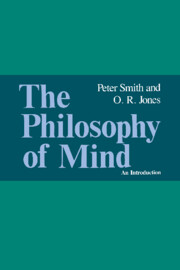Book contents
- Frontmatter
- Contents
- Preface
- Analytical Table of Contents
- PART I Dualism, For and Against
- PART II Towards a Better Theory of the Mind
- PART III Sensation, Thought and Freedom
- XIV Sensations: The Phenomenological Theory
- XV Sensations: Functionalism and Consciousness
- XVI Thinking
- XVII Reasons and Causes
- XVIII Causality and Freedom
- Chronological Table
- Guide to Further Reading
- Bibliography
- Index
XV - Sensations: Functionalism and Consciousness
Published online by Cambridge University Press: 27 January 2010
- Frontmatter
- Contents
- Preface
- Analytical Table of Contents
- PART I Dualism, For and Against
- PART II Towards a Better Theory of the Mind
- PART III Sensation, Thought and Freedom
- XIV Sensations: The Phenomenological Theory
- XV Sensations: Functionalism and Consciousness
- XVI Thinking
- XVII Reasons and Causes
- XVIII Causality and Freedom
- Chronological Table
- Guide to Further Reading
- Bibliography
- Index
Summary
At the beginning of the previous chapter, we sketched a rough outline of a functionalist account of pain. Pain – the suggestion went – is a physical state due to bodily damage or malfunction and which results in propensities to ‘pain behaviour’ (tears, moans, attempts to bring about the cessation of the state, and so forth). This theory faced a vigorous challenge from the initially attractive PP-theory. We therefore went on to argue at length that the PP-theory should be rejected. But fending off one line of attack is obviously not enough to substantiate a functionalist approach to sensations.
In particular, it might well be protested that we haven't yet dealt with the underlying worry about functionalism which makes the rival PP-theory initially attractive. For surely, the critic will say, it is the case that being in pain is a conscious experience in a sense that having a belief isn't. There is something which it is like, experientially speaking, to have a pain; but there is nothing that it is like to possess a given belief (see VIII.8). Yet this crucial difference between sensations like pain and propositional attitudes like belief is not reflected in our sketched functionalist theories so far. On the contrary, both pains and beliefs alike are simply treated as states that intervene between surface stimulations (of skin or eyes or whatever) and behavioural outputs. So isn't the functionalist theory of pain guilty of treating pains and beliefs too much alike, and ignoring the phenomena of conscious experience?
- Type
- Chapter
- Information
- The Philosophy of MindAn Introduction, pp. 207 - 222Publisher: Cambridge University PressPrint publication year: 1986



